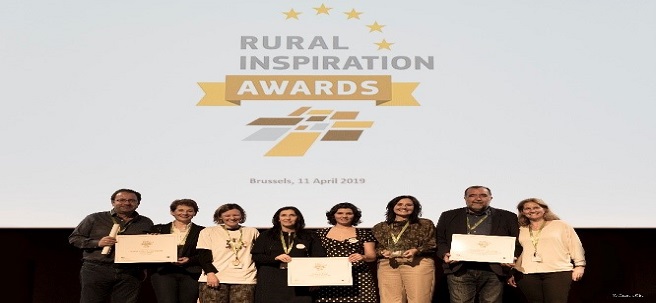
28 de January de 2020
January 30, 2020 - The European Network for Rural Development (ENRD) is launching a new edition of the Rural Inspiration Awards to showcase projects aligned with the new European Green Deal. There will be four categories related to rural climate action or the bioeconomy.
The Rural Innovation Awards, or Rural Inspiration Awards, are presented by the European Network for Rural Development (ENRD) to various projects from different European countries, related to various themes. The aim is to highlight and publicize initiatives that energize and revitalize rural areas and can serve as an example in other regions.
The first Rural Inspiration Awards in 2019 was a success. Each EU country could submit up to 10 projects in any of the different categories on display. A total of 176 projects were submitted, from which 25 nominees were selected, and from these, the winners were chosen. The NRN received 21 projects to represent Spain, submitted 10, and 4 of them were nominated ( Agroberry , Solar Energy , Cowocat Rural , and Pueblos Vivos ).
Agroberry won the award for improving the competitiveness of rural areas.
Given the strong reception of this initiative, the ENRD is once again organizing the 2020 Rural Inspiration Awards this year, for a second time. The themes will change for this edition, as projects that represent the strategic priorities of the new European Green Deal will be recognized.
Four prizes will be awarded. A jury will decide the winning projects in the following themes:
- Bioeconomy: Projects/actions in this category encompass the production of renewable biological resources and the conversion of these and the waste they generate into value-added products, including food, feed, bio-based products, and bioenergy.
- Climate change mitigation: projects/actions that reduce greenhouse gas emissions or remove carbon dioxide from the atmosphere.
- Climate change adaptation: projects/actions to increase the resilience of agri-food and forestry industries and farms to the adverse effects of climate change.
And a fourth prize will be awarded to the project selected by popular online vote , for which a process will also be opened once all applications have been received.
These awards are aimed at good practice projects co-financed by the EAFRD that promote rural climate action or the bioeconomy. If you are interested in participating and meet the requirements, please send an email to the National Rural Network's inbox: redrural@mapa.es . Complete this form in English before February 20 , 2020 .
The National Rural Network will receive, evaluate, and select projects, and assign them to the category we deem most appropriate (always in agreement with the entity submitting the project). Once a maximum of two projects per category have been selected, we will send them to the National Rural Development Network (ENRD), which will then select the winning projects from among those submitted by member countries.
The nominated and award-winning projects will be included in the best practices compilations of both the RRN and the ENRD. For more information about the awards, visit this section of the ENRD website.
The ENRD was created in 2008 by the European Commission's Directorate-General for Agriculture and Rural Development. Its main objectives for the period 2014-2020 are to communicate the benefits of rural development policies, increase participation , improve the quality of Rural Development Programmes (RDPs) co-financed by the EAFRD, and support RDP evaluation.
The constituent groups of the ENRD are National Rural Networks (NRNs), RDP managing authorities and paying agencies, Local Action Groups (LAGs), European stakeholder organizations, agricultural extension services, and other rural development organizations and actors.
Among the missions of the ENRD, like the NRNs, is to exchange ideas and experiences to facilitate and improve the implementation of projects and other initiatives in rural areas based on the application of the RDPs.











